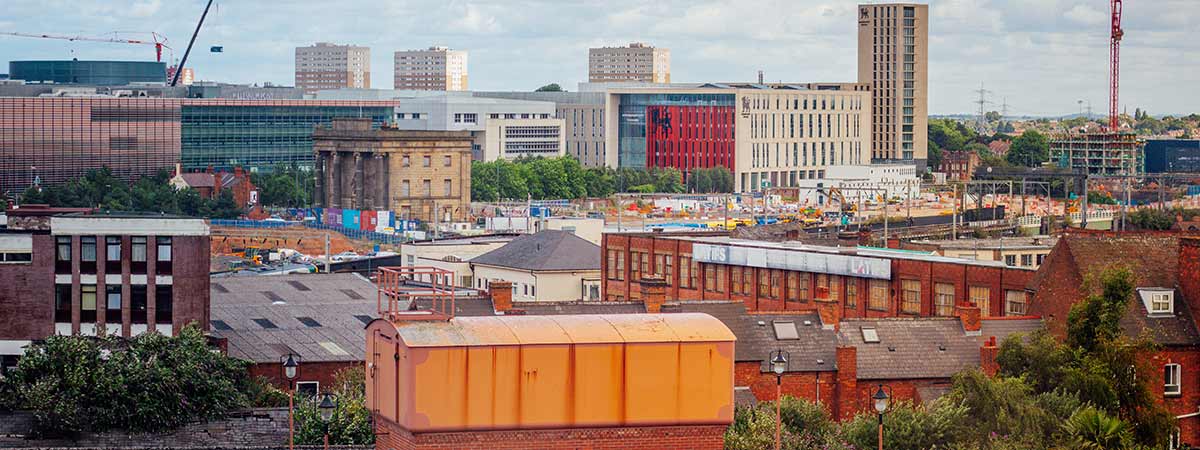
Chartered Surveyor Apprenticeship - BSc (Hons)
Currently viewing course to start in 2026/27 Entry.
Chartered Surveyor roles are of prime importance for the construction industry, and are key in the successful delivery of projects. Our Chartered Surveyor Apprenticeship will typically take five years to complete....
- Level Apprenticeship
- Study mode Blended Learning
- Award BSc (Hons)
- Start date September 2026
This course is:
Overview
Chartered Surveyor roles are of prime importance for the construction industry, and are key in the successful delivery of projects.
Our Chartered Surveyor Apprenticeship will typically take five years to complete. The apprenticeship includes a BSc (Hons) degree qualification and, upon passing an End Point Assessment (EPA), registration as a chartered member of the Royal Institution of Chartered Surveyors (MRICS).
The Chartered Surveyor apprenticeships have been designed by employer working groups of varying sizes, representing four surveying pathways. The apprenticeship is applicable to any of the following roles:
- Commercial Property Surveyors (Real Estate)
- Consultant (Professional) Quantity Surveyors
- Contracting Quantity Surveyors
You will develop the knowledge, skills and behaviours required for chartered surveyors to work effectively within a range of working environments. We value the principles of learning by doing, drawing on a rich history of craft and manufacture in the city.
The assessment process has been designed to:
- Be relevant to the role of a chartered surveyor
- Provide a professional qualification
- Be widely recognised by the sector as a key route into the surveying profession
For more information, see the separate course specifications below:
Download the BSc (Hons) Quantity Surveying course specification
How to apply
You cannot apply directly to the University for a degree apprenticeship. To be eligible for an apprenticeship, you need to be employed in a suitable and relevant job and meet the entry requirements.
If you are currently working at an employer who is offering an apprenticeship, your employer would need to contact apprenticeship-enquiries@bcu.ac.uk to nominate you, and they will then be provided with the relevant documents and paperwork.
If you are not currently employed in an organisation that offers apprenticeships, you can search for opportunities on the Find an Apprenticeship website.
Contact us
If you have any questions about this apprenticeship route, please contact our Apprenticeships team at apprenticeship-enquiries@bcu.ac.uk.
See details of the relevant Apprenticeship standard.
Employers: For more information on offering apprenticeships, please see our employer apprenticeship guidance.
Fees
Course fees for apprenticeships are covered by contributions employers pay to the government levy, or by co-investment for non-levy paying employers.
Since you cannot be asked to pay towards your education, employers should ensure that they are able to cover expenses related to:
- IT (hardware and software)
- Consumables for printing, model making, portfolios and PPE
- Travel in relation to study visits associated directly with the programme
Why Choose Us?
- Apprenticeships offer work based learning – the opportunity to build on existing knowledge and skills.
- You will be supported by highly experienced tutors with a wide range of specialisms and industry experience to support you both with your studies and in practice.
- We have excellent facilities on campus including state-of-the-art equipment, study spaces and an extensive library of learning resources to support you with your studies.
- Study alongside other individuals who have experience within your industry. You will be able to build valuable networks, sharing best practice and supporting you with your future career opportunities.
- At the end of the course, you will have three years work experience, and a degree-level qualification, without taking on any student debt.
Facilities & Staff

Our Facilities
The facility our students value most is not actually on campus, but is the location of the campus in the heart of Birmingham’s Eastside opposite the new High Speed 2 station construction, and minutes from dozens of fascinating live projects within the city centre.
Birmingham as it changes constantly on our doorstep really is our ‘living lab’. By simply looking out the window of our classrooms you’ll be able to witness live projects as they’re happening around us. You’ll constantly be inspired by dozens of fascinating case studies just from walking from the station to the campus.
The facilities on offer to our students reflect the work environment you will enter as you start your career. Learn more about what we have to offer below.
Our staff
Dr Saeed Talebi
College of Built Environment Academic Lead for Teaching Excellence and the Student Experience
Dr Saeed Talebi is an associate professor at the College of Built Environment. Saeed's research interests focus on the intersection between theory and practice. He has led research teams as either Principal Investigator or Co-Investigator on funded projects, particularly in the fields of (a) digital examination of critical infrastructure using...
More about SaeedMr Timothy Lee
Associate Professor in Property Investment
Tim ran his own property firm on the Isle of Wight for over ten years and during that time completed his MSc Real Estate. Following that he secured funding for his PhD at Reading University where he explored the challenges of making energy efficiency improvements to the housing stock.
More about Timothy